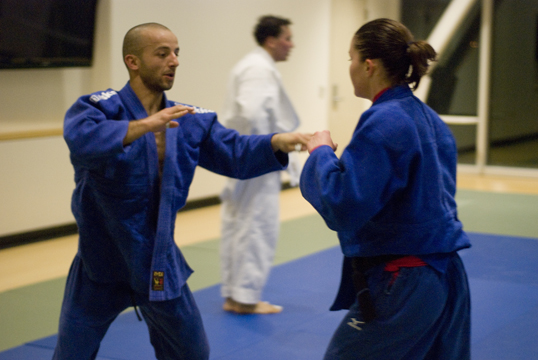City College students taught the humble art of judo
By Alex Emslie
The Guardsman

In a sport that often gets overshadowed because of the overall athletic program’s success, the Judo Club members have steadily brought home honors to City College.
Judo instructor Mitchell Palacio started his career at City College in 1978 and launched the Judo Club in 1984. The program has been around since 1968, when it was founded by Brad Duggan, the former physical education department chair.
Palacio, called sensei by his students and a 6th degree black belt, teaches beginning, intermediate and advanced classes. He said learning the graceful and demanding sport teaches community and humility.
“Judo and school just become a vehicle for students to improve in their community,” he said of the sport he started practicing at age four. “It’s about having fun and there are no attitudes.”
Beginning student Laura Close, who aspires to compete, said she was drawn to judo for precisely those reasons.
“You see two people kick each other’s asses and get up and say ‘good job.’ That’s what got me into this art – the humility of it,” she said. “It’s not about strength.”
During his weekly Tuesday class, Palacio sternly gave instructions or demonstrated holds at one moment, then smiled and praised his students the next.
“Once your opponent has the grip, they got you,” Palacio said during a demonstration on breaking out of a hold. “You have to get into position to break that grip. What happens if you can’t get into that position? You deserve to get thrown.”
One unique aspect of City College judo is the student-organized tournament held at the end of each semester. The 2010 City College of San Francisco Invitational Judo Tournament is scheduled for April 25.
“It’s all on us,” said Emily Lilly, currently ranked No. 4 in her weight class nationally. “The tournament director is always one of the students in the class, and the entire competition is run by the students.”
The upcoming tournament will host 300 to 400 competitors, from the 5 to 6 year-old division up to a black belt-level championship.
Lilly, who has been competing in judo since she was 11, spent six months recovering from a dislocated elbow and torn ligaments she sustained during a tournament. She returned to competition for the U.S. Open international Judo Championship last fall when she lost in the bronze medal match.
“I was still hesitant,” she said. “I wore a sleeve on it, not so much for support but just to make me feel better. It’s tough coming back after a traumatic injury.”
Along with fellow students Samir Golubovic and Ted Meissner, Lilly plans to compete in nationals at the end of April.
Michael Larson, who has been practicing judo for 24 years, was trained by blind competitors in the 1984 paralympics.
“As a visually impaired person, the sport of judo is what we call the acceptance sport, and in Judo, we as blind people have risen to be known as the same,” he said. “We are put on the same point structure. I feel judo strives to keep people on an even level, disability or no disability.”
Lilly and Larson agreed that the judo program at City College is extraordinary.
“The City College Judo Club is not like any I’ve ever been to,” Lilly said. “I used to do judo in Texas and I did it in Southern California before I moved up here. I came up here to work with Mr. Palacio, and it was the best move of my life.”

Comments are closed.